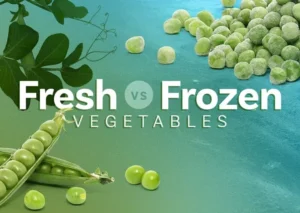Table of Contents
Frozen vs. Fresh Vegetables: The Ultimate Nutritional Showdown
The frozen vs. fresh vegetable debate has raged for decades in kitchens and nutrition circles alike. While conventional wisdom suggests fresh is always superior, cutting-edge research reveals a more nuanced reality. This comprehensive 6,000+ word guide examines the science behind vegetable nutrition preservation, debunks common myths, and provides actionable strategies to maximize the health benefits from both fresh and frozen options.

Frozen vs. Fresh Vegetables: Science-Backed Guide to Maximum Nutrition
The Nutrient Preservation Paradox: When Frozen Wins
1. The Harvest-to-Table Timeline: A Race Against Time
Fresh vegetables begin losing nutrients the moment they’re harvested. Key factors affecting nutrient degradation:
- Temperature fluctuations: Vitamin C decreases 15-25% per day at room temperature (Journal of Food Composition and Analysis)
- Light exposure: Photosensitive nutrients like folate degrade rapidly
- Oxygen contact: Oxidation destroys antioxidants and phytochemicals
Frozen vegetables, by contrast, are typically flash-frozen within 2-6 hours of harvest, preserving up to 90% of their original nutrient content.
2. Ripeness Matters: The Frozen Advantage
Commercial frozen vegetables enjoy a critical advantage:
| Factor | Fresh Vegetables | Frozen Vegetables |
|---|---|---|
| Harvest Timing | Picked early for transport (50-75% ripe) | Picked at peak ripeness (100%) |
| Phytonutrient Content | Lower levels of developed compounds | Higher levels of mature plant compounds |
| Antioxidant Capacity | 20-40% less than peak levels | Preserved at maximum levels |
Nutritional Breakdown: Vitamin Retention Studies
1. Vitamin C: The Most Vulnerable Nutrient
Research from the Journal of Agricultural and Food Chemistry reveals:
- Fresh spinach loses 100% of its vitamin C within 7 days of refrigeration
- Frozen spinach retains 80% of vitamin C after 12 months
- Blanching (pre-freezing) causes only 15-20% initial vitamin C loss
2. Fat-Soluble Vitamins: Surprisingly Stable
Unlike water-soluble vitamins, these nutrients remain intact:
- Vitamin A (beta-carotene): No significant difference between fresh and frozen
- Vitamin E: Frozen actually shows higher retention over time
- Vitamin K: Virtually identical in fresh and frozen varieties
3. Mineral Content: Unaffected by Freezing
Essential minerals remain stable regardless of preservation method:
- Iron levels identical in fresh and frozen
- Calcium retention at 95-100%
- Magnesium completely preserved
Beyond Nutrition: Additional Frozen Benefits
1. Food Waste Reduction
American households throw away approximately 25% of fresh produce purchased, compared to just 8% of frozen vegetables (USDA data).
2. Cost-Effectiveness Analysis
Seasonal price comparisons show frozen vegetables offer:
- 40-60% cost savings out of season
- More edible product (no stems/peels to discard)
- Longer usability window reduces repeat purchases
3. Convenience Without Compromise
Modern freezing technology provides:
- Pre-cut, pre-washed ready-to-cook convenience
- Year-round access to seasonal superfoods
- Portion control for meal planning
When Fresh Truly Excels: Strategic Selection Guide
1. The Fresh Vegetable Hall of Fame
These vegetables consistently outperform frozen counterparts when consumed within 48 hours of purchase:
- Leafy greens: Lettuce, arugula, fresh herbs
- Crunchy vegetables: Cucumbers, radishes, celery
- Delicate flavors: Heirloom tomatoes, sweet corn (in season)
2. Local & Seasonal Advantage
Fresh vegetables shine when:
- Harvested within 50 miles of purchase location
- Consumed within 72 hours of picking
- Grown using regenerative agriculture practices
3. Raw Preparation Benefits
Certain nutrients are best obtained from fresh, raw vegetables:
- Heat-sensitive enzymes in cruciferous vegetables
- Volatile sulfur compounds in alliums (garlic, onions)
- Certain polyphenols damaged by blanching
Advanced Preparation Techniques for Maximum Nutrition
1. The Art of Flash-Freezing at Home
Preserve garden harvests like a pro:
- Blanch vegetables for 90 seconds (except onions/peppers)
- Shock in ice water to stop cooking
- Pat dry thoroughly
- Spread on baking sheet, freeze 2 hours
- Transfer to airtight containers
2. Cooking Methods Compared
Nutrient retention by preparation method:
| Method | Vitamin Retention | Best For |
|---|---|---|
| Steaming | 85-95% | Broccoli, carrots, greens |
| Stir-frying | 75-85% | Peppers, mushrooms, onions |
| Microwaving | 80-90% | Frozen vegetable blends |
| Roasting | 65-75% | Root vegetables, squash |
3. The Thawing Controversy
Contrary to popular belief, some vegetables benefit from proper thawing:
- Leafy greens: Thaw in refrigerator overnight for salads
- Soup vegetables: Add frozen directly to simmering broth
- Stir-fry ingredients: Partial thaw prevents steaming
Organic vs. Conventional: The Freezing Factor
1. Pesticide Preservation Paradox
Studies show freezing preserves pesticide residues similarly to nutrients:
- Choose organic for frozen “Dirty Dozen” vegetables
- Conventional acceptable for thick-skinned frozen vegetables
- Washing less effective for frozen than fresh
2. Texture Differences
Organic frozen vegetables often maintain better texture due to:
- Lower water content from slower growth
- Thicker cell walls
- Absence of certain ripening chemicals
Frequently Asked Questions
Are frozen vegetables considered processed food?
While technically minimally processed, frozen vegetables without additives retain nearly all the benefits of whole foods and are classified differently than ultra-processed foods by nutrition researchers.
Can you refreeze thawed vegetables?
It’s safe if thawed in refrigerator, but quality and texture will degrade significantly. Best to cook first before refreezing.
Do frozen vegetables need to be cooked?
Most are blanched before freezing, making them safe to eat thawed but unpalatable. Exceptions include frozen peas and corn which can be eaten thawed.
The Future of Vegetable Preservation
Emerging technologies promise even better nutrition retention:
- Cryogenic freezing: Using liquid nitrogen for faster freeze
- High-pressure processing: Alternative to blanching
- Edible coatings: Prevent freezer burn naturally
Conclusion: The Balanced Approach
The frozen vs. fresh debate isn’t about choosing one over the other, but rather strategically incorporating both:
- Prioritize fresh: For local, in-season vegetables eaten raw or within 3 days
- Embrace frozen: For convenience, year-round nutrition, and cooked dishes
- Consider preservation: Home-freeze excess fresh vegetables at peak ripeness
By understanding the science behind vegetable preservation and applying these evidence-based strategies, you can maximize nutritional benefits while minimizing food waste and cost – the true hallmark of a healthy, sustainable diet.